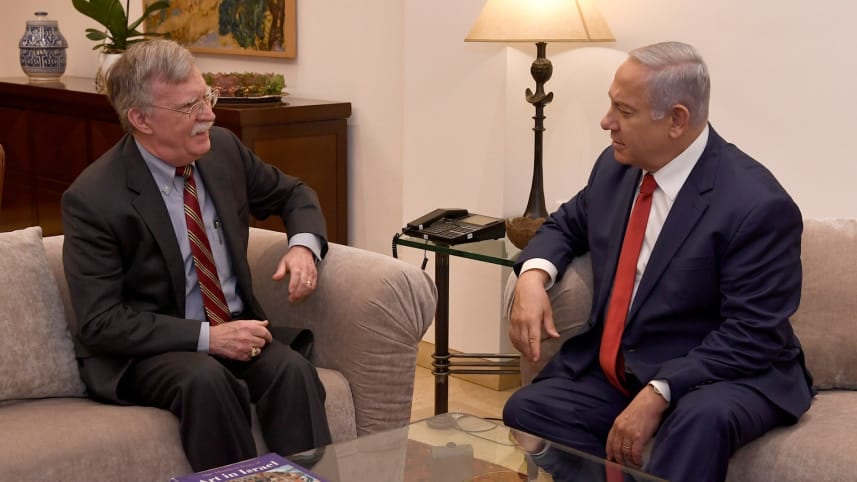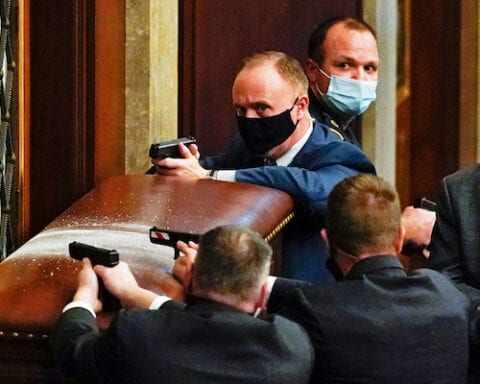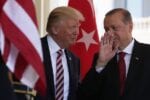Trump’s proclamation that the U.S. would leave Syria caught America’s allies off balance.
On December 19th, 2018, President Donald Trump tweeted that “we have defeated ISIS in Syria,” thus eliminating the need for U.S. troops to remain in the Syrian area of operations. Shortly thereafter, the president said that the U.S. would withdraw its forces from Syria within 30 days.
A video of Trump followed in which he said “it’s time for our troops to come back home.”
Now, three weeks later, the sabers are in the centrifuge. Turkey’s Foreign Minister announced yesterday that his country would attack the Kurdish People’s Protection Units (YPG) if the U.S. withdrawal “is put off with ridiculous excuses like Turks are massacring Kurds.” Given the intermixing of American and YPG forces, such a statement constitutes nothing less than a de facto threat to the U.S.
With Turkey threatening to kill Kurds if the U.S. doesn’t stop saying that it kills Kurds, U.S. Secretary of State Mike Pompeo maintained that the U.S. is committed to withdrawal, defeating ISIS, and expelling “every last Iranian boot” from Syria.
So what has happened?
Trump’s initial announcement of a Syrian withdrawal sent shockwaves through the hallways of power of America’s allies joined in the battle against the Salafist-Jihadists of ISIS. This was in part because no other ally perceived ISIS to no longer be a threat, and more so, because it would mean an immense change in the geostrategic and tactical landscape of the Middle East. Members of the U.S.-led Combined Joint Task Force — Operation Inherent Resolve (CJTF-OIR) protested en masse, as did Israel.
More importantly, the president’s statement sent chills down the spines of the frontline fighting men and women of the U.S.-backed Syrian Democratic Forces (SDF). Not only does the U.S. provide the bulk of air-to-ground capabilities, it also provides tactical level equipment and training, along with vitally important intelligence resources to the SDF and affiliated frontline troops. While European and other regional allies provide particular operational capabilities, overall such contributions pale in comparison to the U.S.
“I got this” – RTE
The decision to withdraw seemingly traces back to a conversation Trump had with the Turkish President, Recep Tayyip Erdogan. Erdogan vowed to take over the struggle against the enemy in Syria, if the U.S. left.
No doubt President Erdogan voiced this offer with a smile, all the while hoping to avoid any clarification as to just what enemy Turkey intended to fight, and how it intended to fight them.
Since their inception, Erdogan has used both the Syrian Civil War and the Western-backed counter-ISIS campaign as excuses or cover to enable attacks on Kurdish enclaves throughout Syria and Iraq. These enclaves are seen, in the eyes of the Erdogan-led Turkish nationalists, as a threat to Turkish national integrity.
“Erdogan has very convincingly informed me that he will wipe out what’s left of ISIS in Syria … and he is a man who can do it,” Trump stated.
The Kurdish enclaves of immediate concern to Erdogan are generally under the control of the Kurdish Democratic Union Party (Partiya Yekîtiya Demokrat, or PYD), the political party which in turn controls the YPG militia — which make up the majority of the U.S.-supported SDF coalition in the war against ISIS. This coalition, along with the Assad government in Damascus, constitute the bulk of the ground forces in the Syrian campaign against ISIS.
As a NATO member (the only member in the Eurasia region), Turkey’s decision to enter the Syrian Civil War in the aftermath of a U.S. military ground presence exodus raises serious questions about its intent.
![Image [President Trump with Turkey's President Recep Tayyip Erdogan, May 16, 2017. (JOSHUA ROBERTS / REUTERS)]](https://limacharlienews.com/wp-content/uploads/2019/01/Trump-Erdogan-000.jpg)
Support, outcry and resignations
When the U.S. began Operation Inherent Resolve (OIR) the operation had a secondary objective: to counter the growing Shi’a-Iranian influence in Syria and the upper Levant. This aspect, in particular, is one in which both the Jewish state of Israel and the region’s Sunni-ruled Arab states remain especially interested. Yet, much to their alarm, Trump’s plans of withdrawal appeared to abandon these interests as well.
The international perception of the policy shift did not improve after Turkish, Russian and Iranian leadership expressed support for the decision.
In between congratulating a decision well made and praising Trump, Russian President Vladimir Putin managed to point out the Moscow-Damascus perspective that the U.S. presence in Syria is illegal. Putin’s remarks caused slight embarrassment for Trump who had earlier that same day tweeted that Russia and Iran were unhappy with the U.S. decision to withdraw from Syria.
To many, the proposed exodus was seen as a betrayal, particularly to the Kurds and their supporters. This perception was also expressed by some in the U.S. political sphere, such as heavyweight Republican Senator Lindsey Graham who rejected the financial benefits of withdrawal while highlighting the betrayal of America’s tactical and strategic allies.
Initially, the President seemingly dismissed anyone who objected to the decision. Secretary of Defense James Mattis, whom Trump has praised as a true warrior, resigned in protest of the decision. Soon thereafter, on Dec. 25th, Brett McGurk, the U.S. Special Envoy to the coalition against ISIL, also resigned in protest.
Letter from @SenatorShaheen @marcorubio @SenTomCotton @SenAngusKing @SenJoniErnst and me to President Trump on withdrawal from Syria. pic.twitter.com/G035schXJu
— Lindsey Graham (@LindseyGrahamSC) December 20, 2018
Course correction
The loss of SecDef Mattis and Special Envoy McGurk in such short order amounted to a devastating public relations blow to President Trump’s Syria policy approach. Both National Security Advisor John Bolton and Secretary of State Mike Pompeo, both widely considered hardline anti-Iran operatives, reportedly began lobbying for reversal of the 30-day withdrawal deadline almost immediately.
While in Jerusalem on a four-day trip to Israel and Turkey, Bolton announced last Sunday that a prevailing condition for U.S. withdrawal from Syria is Turkey guaranteeing not to attack Kurdish positions in Syria. Bolton and Pompeo’s advocacy inside the White House, combined with the outcry of allies from Tel Aviv to London, appears to have made Trump change course. Republican Bob Corker, head of the Senate’s Foreign Affairs Committee, stated in an interview that he believes the President now “knows he’s made a mistake.”

“Bolton has made a serious mistake, and whoever thinks like this has also made a mistake. It is not possible for us to make compromises on this point,” Erdogan said in the Turkish Parliament on Jan. 8th, dropping the conciliatory tone he struck in his New York Times op-ed earlier this week. “Those who are part of the terror corridor in Syria will receive the necessary lesson. There is no difference between the PKK, the YPG, the PYD and ISIL. We are determined to take steps against these terrorist organizations. We will mobilize to neutralize them in Syrian lands very soon.”
Syria SITREP
It is, at any rate, unlikely that ISIS will be gone anytime soon. The battles continue to be fierce, and despite continuously shifting policies and the uncertainty that it brings, the operational tempo in Syria is not slowing down. Even if ISIS is running out of static enclaves, it will continue to operate as a band of bandits, and terrorists, across the region.
As such, it is no surprise that the counter-ISIS coalition, along with the SDF, increased its operational tempo in recent weeks. The U.S. increased air-to-ground sorties, along with the British and French increasing their ground operations. The SDF, along with western special operations assets, continued their push to drive out the last remaining static enclaves of ISIS in Hajin and remaining pockets along the Euphrates River and the Iraqi-Syrian border.
Winter season sandstorms, however, have been disrupting the availability of air capabilities for advancing ground forces. This allowed ISIS to launch counter-offensives against the SDF. One such offensive, outside of Deir Ezzor, reportedly resulted in 23 members of the SDF killed in action, with the enemy force suffering a loss of nine.
“Twenty-three SDF fighters were killed and, nine IS jihadists were also killed in fighting that lasted all night and into Monday morning,” Rami Abdel Rahman of the Syrian Observatory for Human Rights (SOHR) said.

It is not just the SDF and ISIS that are suffering frightful casualty rates. On January 5th at least two British soldiers from the Special Air Services Regiment (SAS-R) were killed, with a further four injured in an ISIS rocket attack in Deir Ezzor. One YPG-SDF soldier was also killed.
As part of clearing operations along the border region, the SDF claims to have captured a group of five foreign fighters that were seeking to escape into Iraq. Among the five were two individuals described as holding American citizenship; Warren Christopher Clark (aka Abu Mohammad al-Ameriki), and Zaid Abed al-Hamid (aka Abu Zaid al-Ameriki). Clark has been named as holding a residence in Houston and is believed to be one of the at least 64 Americans who have travelled to Iraq and Syria to join Jihadist militant groups.
In security-political circles, the general belief is that the U.S. will remain involved in Syrian affairs for the foreseeable future and that any deadlines will accrue extension upon extension until it becomes a protracted and undefined abstraction. For the past week, both NSA Bolton and SecDef Pompeo have been on separate trips to the Middle East, with Pompeo primarily focusing on the Arab Gulf state leaders and Bolton focusing on the Israel-Turkey aspect.
[Main Image: Photo by Joshua Roberts]
[UPDATE: Friday, January 11, 2019: Col. Sean Ryan, spokesman for the U.S.-led coalition, announced that the U.S. has begun withdrawing U.S. forces from Syria. Colonel Ryan said the coalition had “begun the process of our deliberate withdrawal from Syria,” adding that he would provide no further information about “specific timelines, locations or troop movements.” Via AP]
John Sjoholm, Lima Charlie News
[Edited by Anthony A. LoPresti]
John Sjoholm is Lima Charlie’s Middle East Bureau Chief, Managing Editor, and founder of the consulting firm Erudite Group. A seasoned expert on Middle East and North Africa matters, he has a background in security contracting and has served as a geopolitical advisor to regional leaders. He was educated in religion and languages in Sana’a, Yemen, and Cairo, Egypt, and has lived in the region since 2005, contributing to numerous Western-supported stabilisation projects. He currently resides in Jordan. Follow John on Twitter @JohnSjoholmLC
Lima Charlie provides global news, featuring insight & analysis by military veterans and intelligence professionals Worldwide.
For up-to-date news, please follow us on twitter at @LimaCharlieNews
In case you missed it:

![Image Leaving Syria - a misstep continues to haunt America's allies [Lima Charlie News][Photo: JOSHUA ROBERTS]](https://limacharlienews.com/wp-content/uploads/2019/01/Leaving-Syria-a-misstep-continues-to-haunt-Americas-allies-Lima-Charlie-News.png)





![STRATEGIC OPTION | Syrian Endgame - The Hard Truth [Lima Charlie News][Photo: Bulent Kilic]](https://limacharlienews.com/wp-content/uploads/2019/05/STRATEGIC-OPTION-Syrian-Endgame-e1558501175322-480x384.png)





